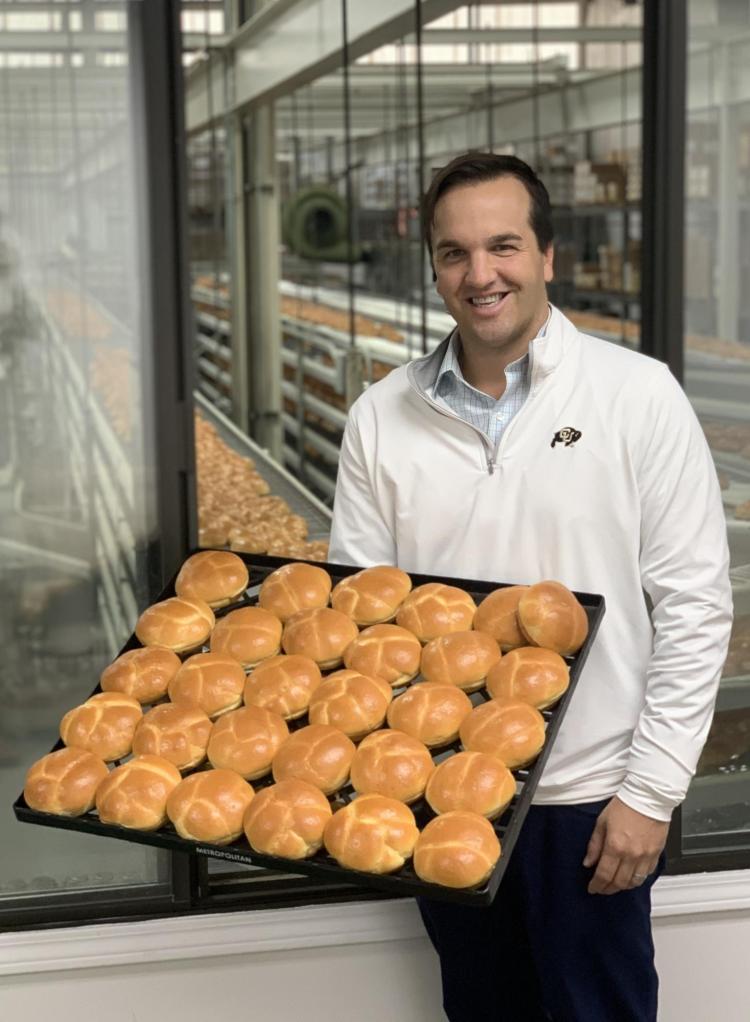Alum’s bread, like his family business, rises steadily
He says his training in economics helped him understand the market forces more fully
Let’s get this out of the way at the very start. When you ask George Kordas (Econ’05) if he was destined to work in his family’s bakery business, he says with a chuckle, “I was bread for it.”
Then he follows up with, “Sorry, that was an awful joke. Carry on.”

George Kordas sports the colors of his alma mater as he shows off some of the family business' freshly baked wares. Photo courtesy of George Kordas.
Yeah, no, um, knead to repeat that. But it is true, Kordas was bred for it. Over the summer and after school, he logged thousands of hours snatching rolls off rapid-fire assembly lines, mixing 1,600-pound batches of gooey dough and setting up timesaving routes for delivery trucks at his family’s bakery business in Detroit, Michigan.
“I was really proud of the family business, and I was very fortunate to have a father that never made me feel pressure to join the business, but rather allowed me to choose any path I wanted. I think in a way this made me realize the incredible opportunity that I had and not to shy away from it.”
Kordas certainly didn’t shy away from it. Today, he’s president of the Metropolitan Baking Company, the third-generation Kordas to run the business. His grandfather, a retired salesman at Ford Motor Company, started it in 1945—operating out of two small houses, a classic mom-and-pop shop where folks came in off the street. Eventually his grandfather expanded with trucks delivering to restaurants and schools around southeastern Michigan.
Today, that delivery area is bigger—much bigger. Kordas estimates several million people eat Metropolitan’s foods on any given day across the country, including at several national restaurant chains ranging from 30 to 1,000-plus locales.
He chalks up much of that growth to advancements in frozen distribution, namely “blast freezing,” which reduces foods’ temperature quickly to prevent it from getting moldy or stale. “Once thawed, the product tastes like it was fresh out of the oven that day; it truly is remarkable,” he says.
Beyond technology, Kordas says two more ingredients for success are hard work and perseverance, which he learned from his dad and grandfather.
“They were among the hardest working men that I have ever met; they’d spend countless hours building this business into one of the largest wholesale baking companies in our region. They reinvested their profit to slowly automate the plant. And now it’s fully automated producing hundreds of thousands of units daily.”
Kordas adds that learning how to evolve with the times helps, too. “You never want your business to become a proverbial dinosaur.”
He is quick to credit his CU Boulder degree in economics, though he admits he had no idea how large the impact would be. “Economics forces you to look in depth at how the world works and how you may be able to utilize that knowledge to lead you on a better path.”
He explains by sharing that the bakery’s largest ingredient, flour, makes up roughly 58 percent of all his ingredients’ cost (he buys up to 30 million pounds of wheat—milled into flour—annually). Pay too much, profits suffer. Oil is another factor—the higher its price, the more it cost to transport wheat and run farm equipment. Then stir in government policies, weather (droughts and floods raise wheat prices due to lower supply), changing diets, market speculation and the value of the dollar.
Economics forces you to look in depth at how the world works and how you may be able to utilize that knowledge to lead you on a better path.”
“They all have to be considered,” Kordas says. “I’m not sure I’d be thinking in these terms and this depth without economics. I’d recommend that all students consider a degree in economics at CU Boulder.”
He also suggests students take risks.
“Go outside of your comfort zone and you’ll learn an incredible amount about yourself if you aren’t afraid to try new things. You have the chance to do anything you want if you’re putting in the hard work to get there. But at this moment, take a minute to sit back and realize that being a student at CU Boulder is an awesome accomplishment. In my opinion it makes you better off than most people who have ever lived. However, I admit that I may be a bit biased.
“There is nothing to fear. No matter where you are or what you are thinking about doing, someone has been at the start faking it ‘til they make it before you,” he says.
Or baking it ‘til they make it.

